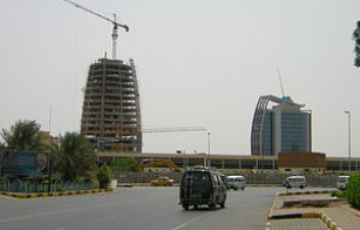Worst of economy has now past, says Sudan’s finance minister
December 22, 2014 (KHARTOUM) – The Sudanese finance minister Badr al-Din Mahmoud declared today that the country has now steered away from recession and economic shock experienced since secession of the oil-rich south in 2011.
 Mahmoud said in statements before parliament after submitting the government’s 2015 budget proposal, that the most important highlights of the budget include bringing inflation rate down to 25%, increasing growth rate to 3.6%, reducing unemployment rate to 19% and bridging the gap between the official exchange rate and the parallel one to 30% .
Mahmoud said in statements before parliament after submitting the government’s 2015 budget proposal, that the most important highlights of the budget include bringing inflation rate down to 25%, increasing growth rate to 3.6%, reducing unemployment rate to 19% and bridging the gap between the official exchange rate and the parallel one to 30% .
He said that total revenues amounted to 61.4 billion Sudanese pounds (SDG) or $11 billion (based on official exchange rate) up 33% from last year with an increase in expenditures by 30%.
The minister noted that following an economic reform program known as the tripartite program, the average GDP growth was 3.1%.
He said that Sudan was able throughout the program to maintain the flow of direct foreign investments at an average of $1.5 billion for the period of 2012 – 2014 while indirect investments for the same period totaled $2.7 billion.
The 2015 budget he said, did not impose any new taxes and maintained fuel and wheat subsidies and created 60,000 jobs in the public sector and increased direct subsidies to 500,000 poor families.
He predicted that economic growth rate at the end of 2014 would reach 3.6% while the trade deficit would drop from of $3.9 billion in 2013 to $ 3.3 billion in 2014 due to the decline in imports from $ 8.7 billion in 2013 to $ 7.7 billion in 2014 .
Mahmoud also projected a surplus in the balance of payments in 2014 of $ 409 million, compared to a deficit in 2013 of $17.6 million.
The budget deficit would account to 1% of the GDP deficit, he added.
This month the International Monetary Fund (IMF) said that Sudan has achieved satisfactory progress in achieving goals set by the Staff-Monitored Program (SMP).
SMP is an informal agreement between a country’s authorities and the IMF to monitor the implementation of the authorities’ economic program. SMPs do not entail financial assistance or endorsement by the IMF executive board.
“Despite the major challenges facing Sudan, performance under the SMP, which expires at end–2014, has been satisfactory,” the IMF said in a statement attributed to its management following the completion of the second SMP review.
“The authorities met all June quantitative targets under the SMP, except for reserve money growth, which the authorities are taking corrective measures to address. On structural reforms, the authorities adopted an amended law on Anti-Money Laundering and Combating the Financing of Terrorism and closed all government accounts in commercial banks. They continue to minimise non-concessional borrowing and maintain satisfactory track record of payments to the Fund as agreed under the SMP. Fund Management welcomes the authorities’ commitment to meeting the program’s objectives,” the IMF said.
The IMF further said that it expects non-oil growth to hit 2.9% this year as a result of strong gold extraction and a rebound in agriculture due to favorable weather.
“Inflation is expected to drop to 29 percent by year-end from 47 percent in July as the one-off effects of the September 2013 fuel price increases dissipate, monetary policy is tightened, and food prices decline owing to the expected good harvest. The fiscal deficit is expected to narrow to about 1.0 percent of GDP,” it added.
For next year, the IMF said it expects a solid growth driven by gold, agriculture, and oil.
“The outlook for 2015 has improved but is subject to domestic and regional risks. Real GDP growth is projected at 3.4 percent supported by a good harvest, robust gold production, and the recovery of oil production,” it said.
Sudan’s GDP is estimated to have grown at 2.7% in 2013 and projected to stand at 3.0% in 2014.
(ST)
